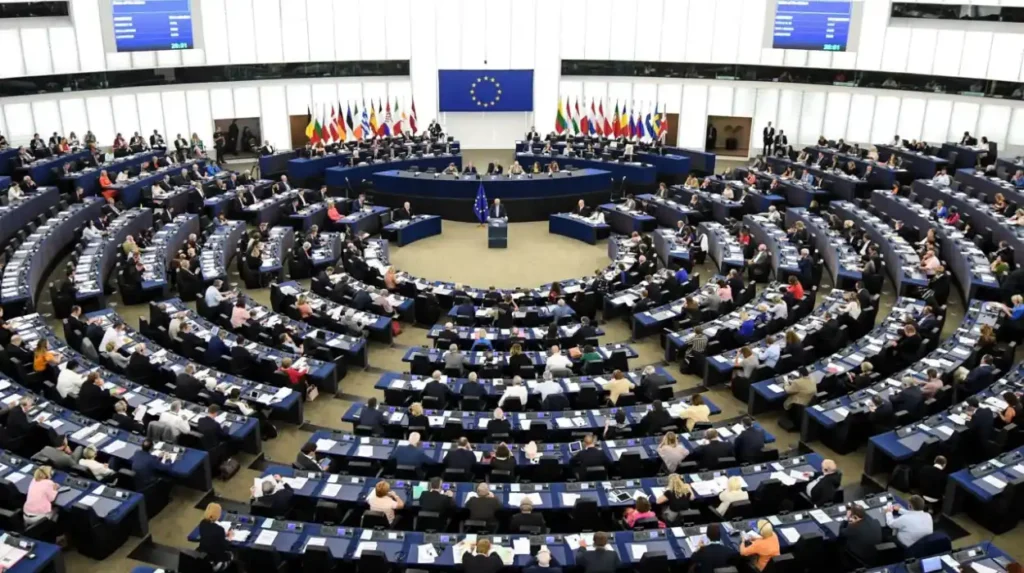The European Parliament has adopted a second interim report condemning Hungary for persistent breaches of the rule of law, judicial interference, corruption, misuse of EU funds, and attacks on civil society, warning of a “hybrid regime of electoral autocracy.” MEPs demand urgent sanctions and tangible consequences, especially amid concerns over AI-generated political content ahead of Hungary’s 2026 elections.
Hungary’s persistent decline of EU values and rule of law
As reported by The European Sting in association with the European Parliament, the latest interim report on Hungary’s rule of law issues was adopted with a clear majority of 415 votes in favour on 25 November 2025. The report takes stock of twelve critical areas, including judicial independence, electoral system functionality, corruption, and misuse of EU funds. It highlights alarming practices, such as Hungary’s supreme court revisiting EU Court of Justice rulings before implementation, which violates established legal norms. MEPs also condemn Hungary’s systematic refusal to enforce judgments by the European Court of Human Rights, ongoing threats to judicial independence, and persistent corruption linked to electoral integrity through clientelist networks. The report stresses the risk to EU funds due to obstacles faced by Hungary’s anti-corruption agency and criticises the European Commission’s contested decision to release cohesion funds to Hungary, calling for guarantees that civil society and final recipients are not deprived of necessary financial support. Additional concerns include the government’s undermining of the national judicial council, restrictions on citizens’ rights, threats to academic freedom, politically motivated business practices, and the de facto constitutional ban on Pride marches in Hungary.
AI interference in upcoming elections
The European Parliament’s report expresses deep concern over the growing use of unlabelled AI-generated political content in Hungary ahead of the 2026 elections. MEPs note that deepfake videos have been deliberately posted and amplified on social media channels tied to Prime Minister Viktor Orbán’s political party, potentially misleading voters and distorting electoral fairness. The report links these developments to the EU’s Digital Services Act, data protection laws, and the AI Act, highlighting potential violations of national electoral standards. This raises red flags regarding the integrity of Hungary’s electoral process and democratic standards.
Calls for sanctions and political accountability
The report repeatedly calls for concrete action against Hungary’s democratic backsliding. It labels Hungary as a “hybrid regime of electoral autocracy” and reproaches the Council for failing to make progress in defending the rule of law through Article 7 procedures initiated in 2018. MEPs denounce Hungary’s frequent use of its veto power in the Council as leverage and its manipulation of budgetary tools to sidestep EU Conditionality Regulation. The report also references the Commission’s investigation into alleged espionage by Hungarian officials within EU institutions, urging rapid delivery of findings and accountability, including the role of Commissioner Olivér Várhelyi. Rapporteur Tineke Strik remarked,
“The lack of decisive action by the Commission and the Council against Hungary has allowed a continuous erosion of democracy and the rule of law. The EU cannot allow Hungary’s autocratization to continue. Any further delay by the Council would violate the very values it claims to uphold”.
Additional democratic concerns and political context
Apart from institutional and judicial issues, the report highlights Hungary’s systematic weakening of the National Judicial Council and failure to uphold fundamental rights. It points to government pressure on independent media through the allocation of state advertising to politically friendly outlets. The report also condemns new restrictions on public assembly, notably the 2025 ban on Budapest Pride marches under the Child Protection Act, which MEPs argue violates the EU Charter of Fundamental Rights. Meanwhile, Hungary faces criticism from European lawmakers for its stance on Ukraine, accused of blocking sanctions and aligning with Russian interests, an allegation Budapest denies, asserting a balanced foreign policy. Concerns are further heightened by a recent mass data leak revealing the political affiliations of over 200,000 Hungarian citizens, which MEPs have described as deeply troubling and called for investigation.
Next steps and parliamentary proceedings
The European Parliament debate and vote on this second interim report took place during the November plenary session in Strasbourg between 24-27 November 2025. The vote, as well as an accompanying press conference featuring rapporteur Tineke Strik and shadow rapporteurs Michał Wawrykiewicz, Krzysztof Śmiszek , Sophie Wilmes, and Konstantinos Arvanitis , underline the urgency with which MEPs view the necessity of stepping up measures against Hungary. Parliamentary members continue to insist the European Commission explore new legal instruments beyond Article 7 to safeguard EU values and to prevent further erosion of democracy in Hungary.







